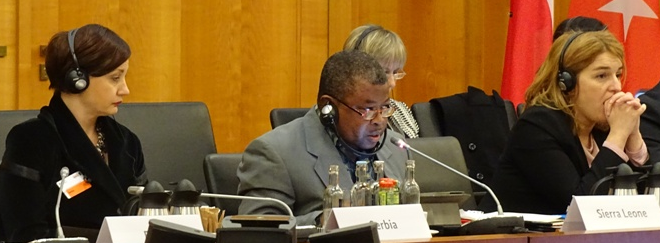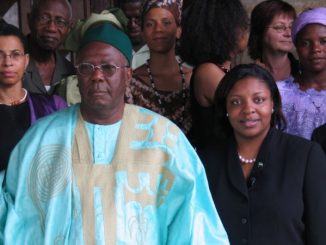
By Umaru S. Jah, Information Attaché—Berlin, Germany

Dr. Sam Sesay making a point at the GFFA conference
Sierra Leone is witnessing a terrible health crisis — the Ebola epidemic—which has adversely affected both the country and its people, halting steady progress that was being witnessed prior to the outbreak. The country´s economy which was, as indicated by factual data, rated among the fastest growing economies across sub-Saharan Africa, has suffered significant stagnation.
All ongoing socio-economic and infrastructural development activities including increasing agricultural productivity have been put on hold. Mining companies have also seized operations while business moguls have abandoned their trade and investment programmes in the country. The human cost has also been grave – the virus has killed thousands of people, leaving most children with no one to call their parents. Indeed, the list is of its disturbing effects is endless!
Notwithstanding those difficult times we are faced with as a people and nation, our leaders in governance have not been taking it lightly in the fight against the scourge, thanks to the forward thinking leadership of Dr. Ernest Bai Koroma. With the help of international health partners and several courageous Sierra Leoneans, the President has been working tirelessly to put the virus under control.
He has been constantly engaging all stake holders across the country, spending sleepless nights to once again restore the dignity and moral values of his people as he believes that the disease is no respecter of mankind in human history.
As a result of those relentless efforts, we have started seeing light at the end of the tunnel and very soon, our country and her people will be freed from the clutches of deaths and anguish caused by the deadly outbreak. This is evident, given the new Ebola infection cases which have, for the past couple of weeks, being limited to single digits right across the country.
In fact, other areas like Kailahun, where the wrath of the virus was first reported, has since been declared Ebola free zone — a clear indication that if we continue to cooperate with measures and bye-laws imposed by our government and other health partners towards the fight against the disease, it will soon be a thing of the past.
With the end of the epidemic in sight, the President has started thinking ahead and putting modalities in place to address post Ebola challenges. He has forecasted the mitigating circumstances of the outbreak when it would have been contained and, as usual, put his lieutenants in readiness for such a daunting task hence the recent participation of Sierra Leone’s Minister of Agriculture, Dr. Joseph Sam Sesay, at the Global Forum for Food and Agriculture (GFFA) in Berlin, Germany.
The GFFA is an annual international conference focusing on central issues regarding agro-food industry. The aim of the forum is to provide opportunity for representatives from across the globe to exchange ideas and reach political agreements on agricultural policy issues relating to food security.
Given the growing demand for food after Ebola in the country, the President has seen the need to ensure the primacy of food security by making sure that Sierra Leone is represented in important fora to explore the economic opportunities available across the globe. Among them is the Global Forum for Food and Agriculture (GFFA). Sierra Leone’s participation in such a key event demonstrates her commitment and determination to not only tackle food insecurity after Ebola but also continue to empower local farmers to ensuring sustainable food production in the country.
Discussing the theme bio-economy in this year’s 7th Agricultural Ministers Summit during the GFFA in Berlin, Sierra Leone’s Agriculture Minister, Dr. Joseph Sam Sesay swiftly took discussants by surprise when he brought to focus issues bothering food productivity in Sierra Leone and Africa in general.
With different levels and nature of development challenges in the global economy, Minister Sesay informed his counterparts that developing countries especially in Africa are faced with challenges of, among other things, increasing productivity to boost domestic supply for self-sufficiency and the fight against hunger. He appealed that such a problem should be taken into consideration if issues relating to food security should be addressed.
However, in addressing the challenges of food security and sustainable development, a cross- sectoral and integrated approach should be a prerequisite. This is why in the Food and Agriculture Organisation (FAO) framework, special emphasis is given to:
“….increasing and improving the provision of goods and services from agriculture, forestry and fisheries in a sustainable manner, thereby responding to the growing demand, while safeguarding the natural resources and ecosystems services on which they rely.”
The Minister seized the opportunity to thank countries who have been very supportive towards the fight against Ebola in Sierra Leone, Liberia and Guinea. He said:
“On behalf of Liberia, Guinea and Sierra Leone, I wish to express our gratitude to countries and organizations that have given support to the fight against the Ebola Viral Disease that has not only undignified our countries but has also seriously punctured the rather very promising strides in the development of our economies. Sierra Leone was one of the top three fastest growing economies in the world with a two digit annual growth rate since two to three years ago before the Ebola hit us from the back.”
In Sierra Leone he went on, government has formulated an Ebola and Post Ebola Programme for the agricultural sector in order to bring it to at least the level it was when it bolstered the country’s economy.
Ebola is a classic case that illustrates how we are living in a Global Village and why we must care for each other. On the basis of the aforesaid, the Minister further requested more support from international partners especially in the agricultural and other critical sectors of our economies during and in the post Ebola period.
In another separate but fruitful meeting held with the German Minister of Agriculture, Mr. Christian Schmidt, Dr. Sesay further made series of requests from his colleague Minister to assist Sierra Leone in preparation for the post Ebola challenges especially in the agricultural sector and further stressed on the need to accelerate efforts in order to avert food crisis in the country after the Ebola Virus Disease in the country.
Responding, Minister Schmidt acknowledged the catastrophic consequences besieging Sierra Leone and other countries affected by the Ebola virus Disease. He promised that he would do everything in his capacity as a Federal Minister of Agriculture to ensure that Sierra Leone gets assistance in especially deforestation.
He disclosed that plans are afoot for strategic investment to prepare countries affected by Ebola through the setting up of a centre for disease control and prevention.



